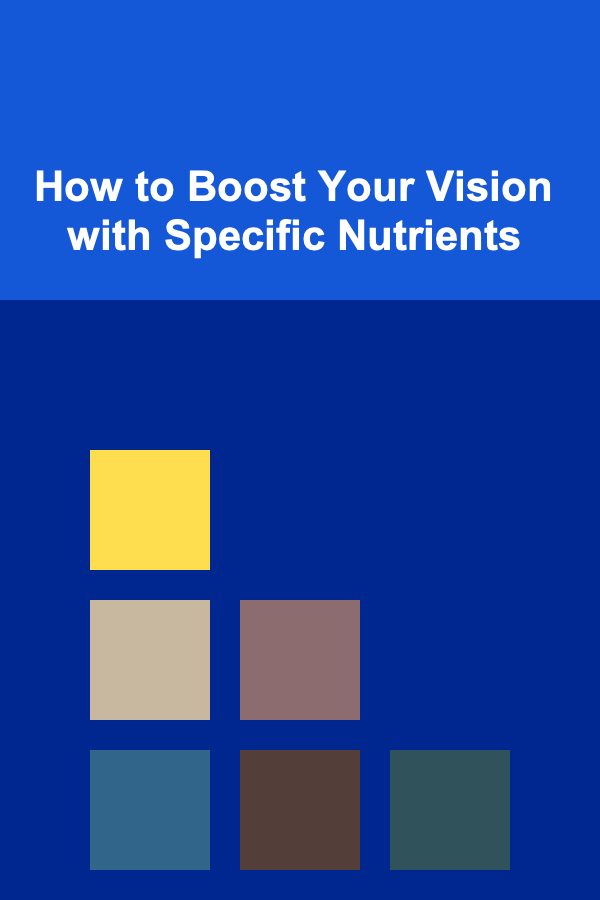
How to Boost Your Vision with Specific Nutrients
ebook include PDF & Audio bundle (Micro Guide)
$12.99$8.99
Limited Time Offer! Order within the next:

Vision is one of the most important senses that allows us to navigate the world. Our ability to see clearly and maintain good eye health is influenced by various factors, such as genetics, lifestyle, and, notably, diet. In recent years, the role of specific nutrients in supporting and enhancing vision has garnered significant attention from researchers and health professionals. Nutrients are essential for the proper functioning of the eyes, and deficiencies in certain vitamins and minerals can lead to vision problems or even more serious conditions such as macular degeneration and cataracts.
This article explores the specific nutrients that are vital for eye health and vision enhancement. It will delve into how these nutrients work, their impact on the eyes, and how you can incorporate them into your daily diet.
The Anatomy of the Eye and Its Nutritional Needs
Before diving into the specific nutrients that are crucial for maintaining and improving vision, it is essential to understand the basic anatomy of the eye and how it functions. The eye is a complex organ made up of several parts, each playing a unique role in the process of vision.
- Cornea -- The transparent, dome-shaped surface that covers the front of the eye, focusing light as it enters the eye.
- Lens -- A transparent, flexible structure located behind the cornea that helps focus light onto the retina.
- Retina -- A layer of tissue at the back of the eye that contains light-sensitive cells called photoreceptors. These cells convert light into electrical signals that are sent to the brain.
- Macula -- The central part of the retina responsible for sharp, detailed central vision.
- Optic Nerve -- Transmits visual information from the retina to the brain.
Each of these components requires specific nutrients to function optimally. Without adequate nourishment, the cells and tissues of the eye may suffer from oxidative stress, inflammation, or degeneration, leading to poor vision or other eye disorders.
Key Nutrients for Eye Health
Several nutrients play a direct role in maintaining the health of the eye and enhancing vision. Some of the most important nutrients for vision are vitamins, minerals, antioxidants, and fatty acids. Let's explore these in detail:
1. Vitamin A: The Foundation of Vision
Vitamin A is perhaps the most well-known nutrient associated with eye health. It is an essential fat-soluble vitamin that plays a key role in maintaining the health of the cornea, the lens, and the retina. Vitamin A is a precursor to retinal , a component of the visual pigment rhodopsin that is crucial for the eye's ability to adapt to low light conditions.
How Vitamin A Works in Vision:
- Rhodopsin Production: Vitamin A is vital for the production of rhodopsin, a protein in the retina that allows the eye to see in dim light.
- Corneal Health: Vitamin A helps maintain the health of the cornea, the outermost layer of the eye.
- Prevention of Night Blindness: A deficiency in vitamin A can lead to night blindness, a condition where individuals struggle to see in low-light environments.
Sources of Vitamin A:
- Animal-based sources: Liver, eggs, and dairy products (especially full-fat milk and butter).
- Plant-based sources : Carrots, sweet potatoes, spinach, kale, and other orange and dark leafy green vegetables. These contain beta-carotene, a precursor to vitamin A.
2. Vitamin C: The Antioxidant for Eye Protection
Vitamin C is a water-soluble antioxidant that plays a crucial role in protecting the eye from oxidative stress. Oxidative stress is a process where free radicals damage cells and tissues, leading to aging and various health issues, including cataracts and macular degeneration. Vitamin C helps neutralize these free radicals, thereby preventing damage to the delicate structures of the eye.
How Vitamin C Works in Vision:
- Protection against Cataracts: Vitamin C helps protect the lens of the eye from the oxidative damage that can lead to cataracts, a condition where the lens becomes cloudy, leading to blurred vision.
- Collagen Synthesis: Vitamin C is necessary for the production of collagen, which is a key structural component of the cornea and the blood vessels of the retina.
- Blood Vessel Health: It supports the integrity of the blood vessels in the eyes, which is essential for proper nourishment of the retina.
Sources of Vitamin C:
- Fruits: Oranges, strawberries, kiwi, and papaya.
- Vegetables: Bell peppers, broccoli, Brussels sprouts, and spinach.
3. Vitamin E: Protecting the Retina and Lens
Vitamin E is another fat-soluble antioxidant that helps protect the cells of the eye from oxidative damage. It is especially important for the health of the retina, as it helps prevent the degeneration of retinal cells that can lead to vision impairment or loss.
How Vitamin E Works in Vision:
- Protection of Retinal Cells: Vitamin E helps protect the retina from oxidative damage caused by free radicals, which are particularly harmful to the high-energy cells of the retina.
- Prevention of Age-Related Macular Degeneration (AMD): Studies have shown that vitamin E, when combined with other antioxidants, can reduce the risk of developing AMD, a leading cause of vision loss in older adults.
Sources of Vitamin E:
- Nuts and seeds: Almonds, sunflower seeds, and hazelnuts.
- Vegetable oils: Sunflower oil, olive oil, and safflower oil.
- Leafy greens: Spinach, kale, and collard greens.
4. Lutein and Zeaxanthin: The Macula Protectors
Lutein and zeaxanthin are carotenoids, a type of antioxidant pigment found in the retina. These nutrients are concentrated in the macula, the part of the retina responsible for sharp central vision. Lutein and zeaxanthin act as natural filters, absorbing harmful blue light and protecting the retina from damage.
How Lutein and Zeaxanthin Work in Vision:
- Blue Light Filtration: These carotenoids absorb harmful blue light, which can contribute to retinal damage and increase the risk of macular degeneration.
- Prevention of Macular Degeneration: By protecting the macula from oxidative stress and light-induced damage, lutein and zeaxanthin play a crucial role in reducing the risk of AMD.
- Enhancement of Visual Acuity: Studies have shown that lutein and zeaxanthin supplementation can improve visual acuity, contrast sensitivity, and glare recovery.
Sources of Lutein and Zeaxanthin:
- Leafy greens: Kale, spinach, and collard greens.
- Yellow and orange vegetables: Corn, carrots, and squash.
- Eggs: The yolks contain both lutein and zeaxanthin.
5. Omega-3 Fatty Acids: Protecting the Retina
Omega-3 fatty acids, particularly DHA (docosahexaenoic acid), are essential fats that play a significant role in maintaining eye health. DHA is a major structural component of the retina, making up a large portion of the retina's photoreceptor cells. Adequate intake of omega-3 fatty acids is crucial for maintaining healthy retinal cells and preventing dry eye syndrome.
How Omega-3 Fatty Acids Work in Vision:
- Retinal Health: DHA helps maintain the structure and function of the retina, particularly the photoreceptor cells that are essential for capturing light and transmitting visual information.
- Reduction of Dry Eye Syndrome: Omega-3 fatty acids help reduce inflammation in the eyes and support the production of healthy tears, which can alleviate symptoms of dry eye syndrome.
- Prevention of Retinal Diseases: Omega-3s have been shown to reduce the risk of developing age-related macular degeneration and diabetic retinopathy, both of which can lead to vision loss.
Sources of Omega-3 Fatty Acids:
- Fatty fish: Salmon, mackerel, sardines, and tuna.
- Chia seeds, flaxseeds, and walnuts: These plant-based sources provide ALA (alpha-linolenic acid), another type of omega-3 fatty acid.
- Algal oil: A plant-based source of DHA, suitable for vegans.
6. Zinc: Enhancing Night Vision and Immune Function
Zinc is a trace mineral that plays a crucial role in eye health. It is involved in the production of melanin, the pigment that helps protect the retina from light damage. Zinc also supports the immune function of the eye, helping to prevent infections and other eye diseases.
How Zinc Works in Vision:
- Night Vision: Zinc is required for the conversion of vitamin A into its active form, which is essential for the production of rhodopsin in the retina. This process is vital for optimal night vision.
- Prevention of Macular Degeneration: Zinc helps protect the retina and may slow the progression of age-related macular degeneration.
- Immune Support: Zinc is important for maintaining the immune system of the eye, helping to prevent infections like conjunctivitis.
Sources of Zinc:
- Animal-based sources: Red meat, poultry, and shellfish (especially oysters).
- Plant-based sources: Beans, lentils, chickpeas, pumpkin seeds, and cashews.
Conclusion
Maintaining and enhancing vision is a multifaceted process that requires a combination of lifestyle habits, including proper nutrition. A diet rich in specific nutrients like vitamin A, vitamin C, vitamin E, lutein, zeaxanthin, omega-3 fatty acids, and zinc can provide significant support for eye health and help protect against common vision problems such as macular degeneration, cataracts, and dry eyes.
Incorporating these nutrients into your diet through a variety of whole foods such as leafy greens, fruits, vegetables, fatty fish, nuts, and seeds will go a long way in promoting optimal eye health. By making informed dietary choices and adopting a holistic approach to vision care, you can safeguard your eyesight for years to come.

How to Create a Personalized Zen Space in Your Bedroom
Read More
How to Create a Secure Digital Archive for Important Documents
Read More
How to Optimize Closet Space with Creative Solutions
Read More
How to Use Analytics to Optimize Your Content Strategy
Read More
How to Cultivate Personal Boundaries
Read More
Navigating In-Laws: Strategies for Family Harmony
Read MoreOther Products

How to Create a Personalized Zen Space in Your Bedroom
Read More
How to Create a Secure Digital Archive for Important Documents
Read More
How to Optimize Closet Space with Creative Solutions
Read More
How to Use Analytics to Optimize Your Content Strategy
Read More
How to Cultivate Personal Boundaries
Read More